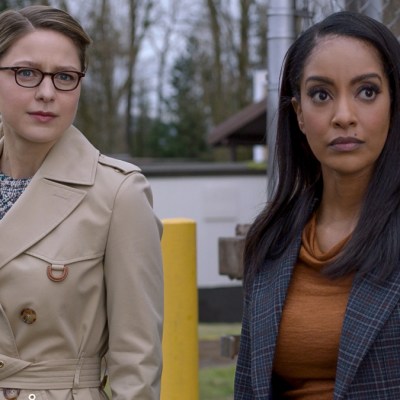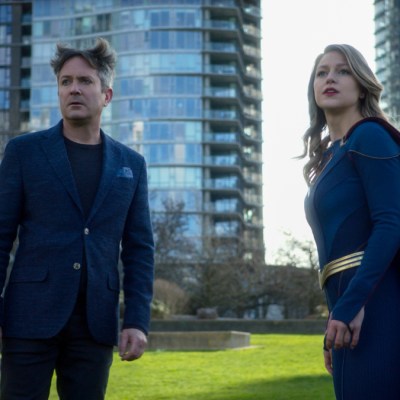Kelly Olsen’s Guardian Debut is Supergirl at Its Best
Supergirl star Azie Tesfai tells us about Kelly Olsen’s journey, the rise of Guardian, and why superhero shows are so uniquely positioned to tell stories that matter.

The following contains Supergirl spoilers
Supergirl Season 6 Episode 12
Out of all the Arrowverse shows, Supergirl has always been the most upfront and open about its politics. From explicitly positioning Kara Zor-El as a refugee in the expository narration that opens each episode to telling stories about immigration, police brutality, and LGBTQ rights, this is a show that takes the promise of hope, help, and compassion for all very seriously.
Unafraid to tackle potentially difficult or uncomfortable topics head-on, Supergirl frequently challenges the hearts and minds of its viewers with thorny big-picture questions about what being a hero really means and what the concept of universal justice should look like. And while Kara’s huge heart and hopeful, optimistic nature often make her a natural choice for a sort of in-universe moral compass, the show is equally willing to ask what happens when the community that most needs her help is one whose struggle she doesn’t even entirely see.
That is the question at the heart of “Blind Spots,” an excellent and emotional hour that finally sees Kelly Olsen officially take up her brother’s mantle as Guardian – in a badass new suit – even as it wrestles with complex questions of empowerment, systemic injustice, and who heroes are really meant to serve.
As Guardian, Kelly has a chance to stand up for those she sees as most in need, and who too often find themselves left behind and overlooked by those in power – even by generally well-meaning heroes like Kara, Alex, and Nia.
“[Kelly] just becomes a real hero and steps into her power,” Supergirl star Azie Tesfai tells Den of Geek. “To play a woman who is so kind and smart and compassionate, and all of these attributes that she has as an individual and then be able to magnify all that by being a superhero, as a Black gay woman? It doesn’t get any better than that.”
Supergirl has been building up to Kelly’s Guardian debut in a deft and organic way throughout the past several episodes, using her involvement with the case of two alien brothers and their struggles with the foster system and the prison industrial complex as a framework to illustrate her shifting understanding of what heroes are meant to be and do. And Tesfai herself has been a big part of spearheading that exploration.
She made Arrowverse history as the first CW actor to co-write an episode, but her work on Kelly’s Season 6 story isn’t just limited to “Blind Spots.” The actress spent over a month working in the series’ writers room, “break[ing] the arc, the whole of [Episode] 9 and 10 to her journey through this”.
“Kelly and I went through this journey together of finding our place – finding our footing and then really finding our power. It was an interesting experience because we truly as character and person and actor went through this emotional arc together,” Tesfai says
She credits last summer’s Black Lives Matter protests and the ongoing inequalities highlighted by the coronavirus pandemic with influencing and “infusing” how she tried to structure Kelly’s arc and the larger social justice issues she wanted to try and “unpack” within the story.
“It’s very personal, to me,” Tesfai says. “A lot of the things Kelly says in this episode are things that I’ve either said or wanted to say, but didn’t feel empowered to do so.”
The episode sees the Ormfell building – the structure marked just last week for much-needed affordable housing in the low-income Heights neighborhood – implode, the latest piece of collateral damage in Supergirl’s battle against the villainous imp Nyxly. Kelly is furious and frustrated in the wake of its destruction, as the local hospital is overwhelmed, neighborhood residents are growing increasingly sick from a mysterious illness, and the very people who should care most about those with the least appear too busy to help.
“The nuance of all of those experiences are rarely explored, and I find that interesting and important to tell because you want everyone to feel a version of [themselves is] seen in these stories,” Tesfai says.
“It felt important to not just tell my specific perspective as a Black woman, but try to infuse all of our perspectives as much as I possibly could,” she continues. “It’s nuanced and it’s complicated and not every Black experience is the same and I think sadly that when you only have one character representing a group, they have to encompass everything.”
To create a more well-rounded portrayal of the Black experience in National City and within the Supergirl universe as a whole, Tesfai wanted to make sure that “Blind Spots” was about more than just Kelly’s journey.
“I felt like we needed to tell this from not just my perspective but Orlando and Joey and Diggle, and even J’onn, as a foreign alien and what that looks like,” Tesfai says. “Just more outlets to tell this story.”
To that end, she and former Arrow star David Ramsey, who plays Diggle and who both guest-starred in and directed this episode, would have regular dinners together to discuss his perspective on his character and how to incorporate diverse experiences into her storytelling.
Because while Kara is undoubtedly a hero and a symbol of hope, light, and positivity to almost everyone she comes in contact with, she isn’t perfect. She has “blind spots” of her own, and can’t – and probably shouldn’t – be the solution to every problem for everyone. Yes, her absence from the Heights is largely due to her focus on stopping Nyxly and saving the greatest number of people from harm at her hands. But what about the parts of the city that are already experiencing harm, and whose struggles are often ignored?
“I think that a lot of superhero shows make the superhero the hero, and that was something that we discussed with this where, at a certain point, if you just look at society, like it doesn’t benefit for one person to be the answer. It never works,” Tesfai says. “So it’s about empowering other people – not saving people, but empowering other people to be their own heroes. That’s always felt really important to me as the lesson that we give our fans.”
Part of Kelly’s decision to fully become Guardian, at last, is her desire to be that sort of hero, someone who offers the residents of the Heights a hand up even as she uses her shield to defend them. But it’s also in response to a far more difficult question – one that isn’t something that can be answered in a single episode. On a show whose very ethos is built on hope, what does that emotion look like for a community that often has little reason to believe that anyone cares about them or even sees their struggles?
For Tesfai, one of the most important aspects of “Blind Spots’” story is that the episode doesn’t wrap up the issues facing Kelly or the community she so desperately wants to help in a neat and tidy bow.
“The format of our show and all the superhero shows is: Problem is presented, you talk about it, you fight the big fight scenes, you have a reflective moment, it’s solved,” Tesfai says. “That just doesn’t work with this, and to have the last scene be something that feels totally open-ended and uncomfortable, was really important.”
All too often, we as a society assume that just because something is uncomfortable, that also means that it is bad, and Tesfai is quick to point out that sort of discomfort is often a part of growth.
“You want to make sure that the audience doesn’t think that this should be easy or that everyone should just feel okay,” Tesfai says. “Because then we’re not doing our justice and trying to set an example for what these conversations hopefully should look like in their own lives. “
The episode’s final scene features a heartfelt “Dansen” conversation about love, support, and allyship that feels warm and necessary in its own right, but still leaves room for both characters to continue to evolve and grow beyond this moment.
“Part of the whole point of this is that you should feel a little bit uncomfortable,” Tesfai says. “It’s complicated – you think Kelly is going to feel great after the [last] scene and you realize, oh no this is – it’s a continuous unpacking. It’s a continuing conversation. How do you hold space for someone when you don’t fully understand what they’re going through – even in an intimate relationship, even when having understanding can be a luxury and sometimes more for you than the other person? What does that look like?”
However, despite the heavy emotion of this installment, Tesfai says that Alex and Kelly’s relationship “just gets better and better” in the series’ final run of episodes.
“I am grateful that a lot of our conflict – which is rare [to begin with] – comes from either our pasts or from external situations that we work through together. This conversation is something that’s very much within their dynamic and it’s a continuing [journey]. They have a lot of big life moments that are going to happen this season, [including] some great Sentinel and Guardian fight scenes coming up that fans are going to love.”


